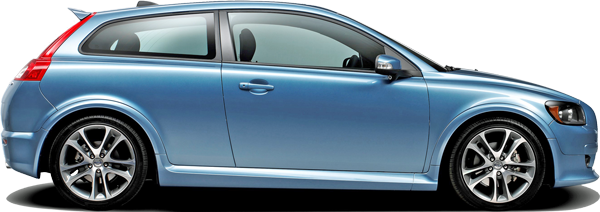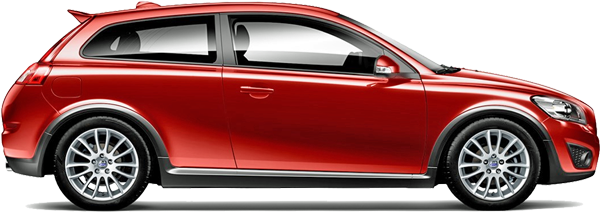The Comparative Analysis :
Volvo C30 D5 (08 - 09) vs. Volvo C30 2.0 (09 - 12)
€ 26,300

€ 22,700

€ 26,300
Base Price ⓘBase price of a new vehicle with standard equipment in Germany at market launch.
€ 22,700
ⓘBase price of a new vehicle with standard equipment in Germany at market launch. Price Info
Vehicle Dimensions
Тhere is barely any difference in dimensions between the two vehicles. Both cars are the same width and height, but the C30 D5 is 0.6 inches shorter.
C30 D5
C30 2.0
57
70.2
80.3
57
70.2
80.3
70.2 in
Width
70.2 in
80.3 in
Width Incl. Mirrors
80.3 in
57 in
Height
57 in
103.9
167.4
103.9
168
167.4 in
Length
168 in
103.9 in
Wheelbase
103.9 in
Vehicle Weight
C30 D5
C30 2.0
3230 lb
Curb Weight
3117 lb
4189 lb
Gross Vehicle
Weight
Weight
3858 lb

Weight Difference:
112 lb
3.47 %

General
C30 D5
C30 2.0
M
Generation
M
Hatchback
Car Body Style
Hatchback
Diesel
Fuel Type
Mid-Grade Unleaded

Front-wheel drive
Drivetrain
Front-wheel drive

6-speed manual transmission
Transmission
5-speed manual transmission
Engine
C30 D5
C30 2.0
Straight-five diesel engine with two turbochargers (biturbo)
Engine Type
Straight-four gasoline engine (naturally aspirated engine)
D5244T8
Engine Code
B4204S3
4
Valves
4
5
Cylinders
4
2.4 L / 117 cu in
Displacement
2 L / 98 cu in
178 hp
at 4000 rpm
Power
143 hp
at 6000 rpm
C30 D5
178 hp
143 hp
C30 2.0
295 lb‑ft
at 2000 rpm
Max. Torque
136 lb‑ft
at 4500 rpm
C30 D5
295 lb‑ft
136 lb‑ft
C30 2.0
Performance
C30 D5
C30 2.0
140 mph
Maximum Speed
130 mph
7.7 sec
Acceleration 0 to 62 mph
9.4 sec
62 mph
62
mph
mph
351 ft
0.000 sec

C30 D5
62 mph
62
mph
mph
430 ft
0.000 sec

C30 2.0
▶ REPLAY
18.15 lb/hp
Weight-to-Power Ratio
21.8 lb/hp
C30 D5
18.15 lb/hp
21.8 lb/hp
C30 2.0
Fuel Economy / Emissions
C30 D5
C30 2.0
Fuel Economy
38 mpg
combined
31 mpg
C30 D5
38 mpg
31 mpg
C30 2.0
28 mpg
city
22 mpg
47 mpg
highway
41 mpg
15.9 gal
Fuel Tank Capacity
14.5 gal
601 mi
Range
450 mi
C30 D5
601 mi
450 mi
C30 2.0
Environmental Impact
127.6 kWh
Total Energy Consumption
per 100 miles ⓘThe total energy consumption per 100 miles is the amount of energy consumed by a vehicle when burning fuel or using electricity per 100 miles (final energy), and the energy required to produce the appropriate amount of fuel or electricity (primary energy).
per 100 miles ⓘThe total energy consumption per 100 miles is the amount of energy consumed by a vehicle when burning fuel or using electricity per 100 miles (final energy), and the energy required to produce the appropriate amount of fuel or electricity (primary energy).
144 kWh
C30 D5
127.6 kWh
144 kWh
C30 2.0
Euro 4
Emission Standard
Euro 4 / Euro 5
264 g/mi (NEFZ)
CO2 Emissions
285 g/mi (NEFZ)
Practical Convenience
C30 D5
C30 2.0
3
Doors
3
4
No. of Seats
4
959 lb
Maximum Payload
741 lb
7.9 cu ft
Trunk Volume
7.9 cu ft






26.1 cu ft
Cargo Volume (Seats Down)
26.1 cu ft


















